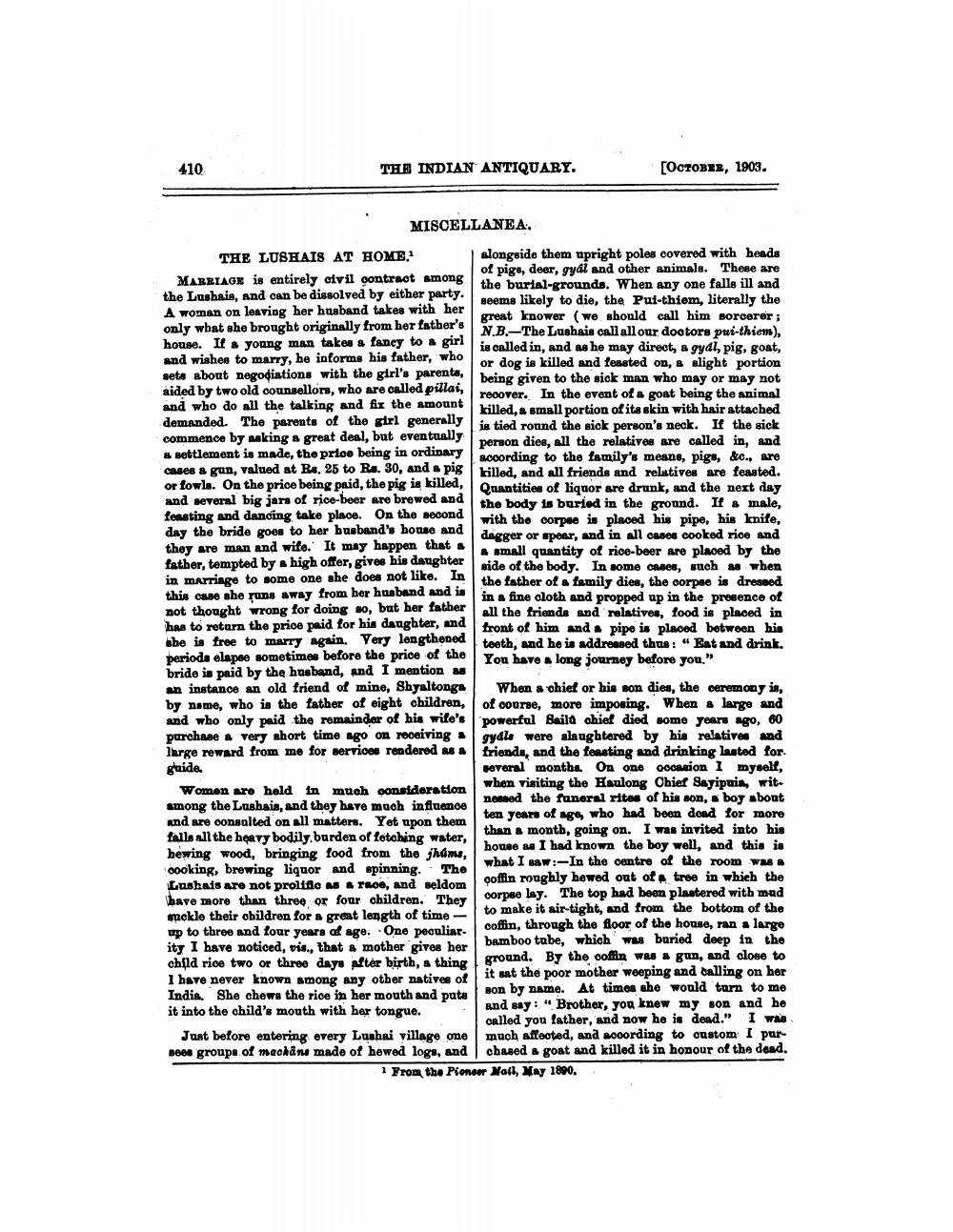________________
410
THE INDIAN ANTIQUARY.
[OCTOBER, 1903.
MISCELLANEA.
THE LUSHAIS AT HOME.
alongside them upright poles covered with heads
of pige, deer, gyal and other animals. These are MARRIAGE is entirely civil contract among
the burial-grounds. When any one falls ill and the Lushais, and can be dissolved by either party.
seems likely to die, the Pui-thiem, literally the A woman on leaving her husband takes with her
great knower (we should call him sorcerer ; only what she brought originally from her father's
N.B.-The Lushais call all our doctors pui-thiem), house. If a young man takes a fancy to a girl
is called in, and as he may direct, a gyal, pig, goat, and wishes to marry, he informs his father, who
or dog is killed and feasted on, & slight portion sets about negotiations with the girl's parents,
being given to the sick man who may or may not aided by two old counsellors, who are called pillai,
recover. In the event of a goat being the animal And who do all the talking and fix the amount
killed, a small portion of its skin with hair attached demanded. The parents of the girl generally
in tied round the sick person's neck. If the sick commence by asking a great deal, but eventually
person dies, all the relatives are called in, and & settlement is made, the prioe being in ordinary
according to the family's means, pigs, &c.are cases a gun, valued at Rs. 25 to Rs. 30, and a pig killed, and all friends and relatives are feasted. or fowls. On the price being paid, the pig is killed,
Quantities of liquor are drunk, and the next day and several big jars of rice-beer are brewed and
the body is buried in the ground. If & male, feasting and dancing take place. On the second
with the corpse is placed his pipe, his knife, day the bride goes to her busband's house and
dagger or sporr, and in all cases cooked rice and they are man and wite. It may happen that
& small quantity of rice-beer are placed by the father, tempted by a high offer, gives his daughter
side of the body. In some cases, such as when in marriage to some one she does not like. In
the father of a family dies, the corpse is dressed this case she runs away from her husband and is
in a fine cloth and propped up in the presence of not thought wrong for doing so, but her father
all the friends and relatives, food is placed in has to return the price paid for his daughter, and
front of him and pipe is placed between his she is free to marry again. Yery lengthened
teeth, and he is addressed thus: "Eat and drink. periods elapse sometimes before the price of the
You have a long journey before you." bride is paid by the husband, and I mention as an instance an old friend of mine, Shyaltonga When a chief or his son dies, the ceremony is, by name, who is the father of eight children, of course, more imposing. When a large and and who only paid the remainder of his wife's powerful Baila chief died some years ago, 60 purchase a very short time ago on receiving a gyale were slaughtered by his relatives and large reward from me for services rendered as a friends, and the feasting and drinking lasted for guide
several months. On one ocasion I myself, Women are held in much consideration
when visiting the Haulong Chief Sayipuin, wit. among the Lushais, and they have much influence
nessed the funeral rites of his son, a boy about and are consulted on all matters. Yet upon them
ten years of age, who had been doad for more falls all the heavy bodily burden of fetching water,
than a month, going on. I was invited into his bewing wood, bringing food from the jhams,
honse as I had known the boy well, and this is
what I saw:- In the centre of the room was a cooking, brewing liquor and spinning. The Lushais are not prolific as ., and seldom
coffin roughly bewed out of tree in which the have more than three or four children. They
corpae lay. The top had been plastered with mad suckle their children for a great length of time
to make it air-tight, and from the bottom of the up to three and four years d age. One peculiar.
coffin, through the floor of the house, ran a large ity I have noticed, vis., that a mother gives her
bamboo tube, which was buried deep in the child rice two or three days after birth, a thing
I ground. By the coffin was a gun, and close to
groung I have never known among any other natives of it sat the poor mother weeping and balling on her India. She chews the rice in her mouth and puts 80
son by name. At times she would tarn to me it into the child's mouth with her tongue. .
and say: "Brother, you knew my son and he
called you father, and now he is dead." I was Just before entering every Lashai village one much affected, and according to custom I parBee groups of machine made of hewed loge, and chased a goat and killed it in honour of the dead.
1 From the Pronour Mail, May 1890..




